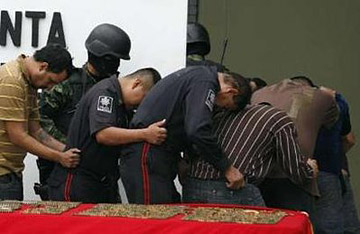
|  |  |  News Around the Republic of Mexico | October 2009 News Around the Republic of Mexico | October 2009  
Zetas Terrorizing Mexican Border Cities
 Dudley Althaus - SAEN Dudley Althaus - SAEN
go to original
October 27, 2009


| | Soldiers lead away detainees after they were presented to the media at the military zone on the outskirts of Monterrey October 26, 2009. The military detained 15 members of the Zetas, the armed wing of the Gulf cartel, including two policemen, during an operation late Sunday, according to local media. (Reuters/Tomas Bravo) |  |
Matamoros, Mexico — This border city near the mouth of the Rio Grande is eerily quiet most days — because its streets are largely the lair of the Zeta gunmen, the most feared and savage gangsters in Mexico.

On other days, gunbattles ensue in broad daylight between heavily armed Zeta enforcers and those who get in their way — as happened last month when soldiers stopped a suspicious carload of men on a street that runs along a Rio Grande levee through a wealthy Matamoros neighborhood. The gunmen opened fire and tossed grenades. Bullets tore into houses and businesses and even flew across the Rio Grande, hitting buildings and a parked car at the riverfront campus of a University of Texas branch campus.

“We have this fear of being in the wrong place at the wrong time,” said anthropologist Tony Zavaleta, acting provost of the University of Texas at Brownsville, whose family has lived on both sides of the Rio Grande for centuries.

Zeta cells have attacked Mexican towns in platoon-strength numbers; fought hours-long skirmishes with Mexican troops in the streets of Matamoros and in Monterrey and other cities; massacred hundreds of competitors, often beheading and dismembering them; and assassinated police chiefs and local politicians.

Employing military-style tactics and frightening firepower, the Zetas have transformed Mexican drug trafficking from a law enforcement problem into what seems an invincible criminal insurgency.

“These are not your everyday assassins,” said Luis Astorga, an expert on Mexico's narcotics trade and the gangsters who control it. “This is more like an urban guerrilla organization.”

Formed by army special forces deserters, the Zetas have rained terror upon much of the country this decade as they battle criminal rivals, the army and police for drug-smuggling routes to U.S. consumers.

“Zeta organization and planning has been outstanding, and the shock value of Zeta operations has been unequaled,” military strategist Max Manwaring of the U.S. Army War College wrote in a recent report on Mexico's criminal paramilitary groups.

Zeta gunmen and their accomplices routinely blockade Matamoros' downtown streets. Last winter, the gangsters mobilized thousands of people to briefly close the region's bridges across the Rio Grande, halting trade.

“We are living things we've never seen before,” said Rebeca Rodriguez, director of a respected human rights advocacy group in Reynosa, 50 miles upriver from Matamoros.

The Zetas' success has forced other gangs — based in the Pacific coast states of Sinaloa, Guerrero and Michoacán, as well as the industrial suburbs of Mexico City — into an arms race, with most organizations now using some quasi-military tactics.

“The other groups have to respond with the same strategies,” Astorga said. “It's both a mafia and a military perspective.”

Recruited to the dark side by then-Gulf Cartel boss Osiel Cardenas, the Zetas first won notice five years ago warring with other mobsters for control of the Laredo area. Hundreds died before the groups settled into a truce in 2006.

Since Cardenas' extradition to the U.S. in early 2007, the Zetas have become businessmen as well as killers, their fingers in most every illicit activity.

And despite the arrests in the past year of several top Zeta bosses and the seizure of tons of cocaine and millions of dollars in cash, cities bordering South Texas remain their fiefdom.

“They are running the show,” said a wealthy Texas executive with deep business and personal connections on both sides of the Rio Grande. “No mayor can operate in the northern border without having at least a peace agreement with them.”

Mexican border residents complain of rising extortions and petty crime carried out or condoned by the Zetas. Few people living north of the border come to shop or visit relatives any longer.

But the cartel's firm and unrivaled grip largely has freed the region from the inter-gang slaughter being visited upon Ciudad Juárez and other cities.

The Zeta-controlled cities bordering far South Texas have suffered just 21 underworld killings this year through September 30, a human rights group estimates. Still, at any moment, it can change.

“We have the soldiers on one side, the thugs on the other, and the society is the cushion between them,” said Rodriguez, the human rights advocate. “They have these cities besieged.”
|

 |
|  |



